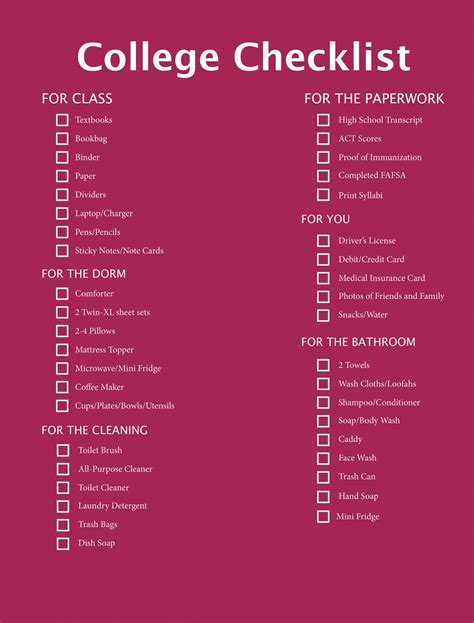As you embark on an exciting journey towards higher education, it’s crucial to be well-prepared to maximize your chances of success. This comprehensive checklist will guide you through every essential step, ensuring a smooth transition to college life.

Academic Preparation
- Solidify Core Academic Skills: Hone your reading, writing, and critical thinking abilities through rigorous academic coursework and standardized test preparation.
- Research Majors and Career Paths: Explore different majors and career options that align with your interests and aspirations.
- Build a Strong GPA: Strive for high grades throughout high school, as your transcript will play a significant role in college admissions.
- Take AP/IB Courses: Challenge yourself with advanced coursework to earn college credit and demonstrate academic rigor.
- Participate in Extracurricular Activities: Engage in activities that showcase your leadership, teamwork, and problem-solving skills, such as sports, clubs, or community service.
College Admissions
- Create a Master List of Colleges: Research potential colleges that fit your academic, financial, and social preferences.
- Attend College Fairs and Visit Campuses: Interact with college representatives and get a firsthand experience of different institutions.
- Complete College Applications: Dedicate time to carefully craft your personal statement, essays, and other application materials.
- Submit Standardized Test Scores: Take the SAT/ACT and strive for scores that meet or exceed admission requirements for your target schools.
- Secure Letters of Recommendation: Request recommendations from teachers, counselors, and other individuals who can attest to your academic abilities and character.
Financial Planning
- Estimate College Costs: Research tuition, fees, housing, and other expenses associated with your prospective colleges.
- Explore Financial Aid Options: Apply for scholarships, grants, and loans to offset the cost of attendance.
- Consider Work-Study Programs: Explore employment opportunities on campus to earn extra income while gaining valuable work experience.
- Create a Budget: Develop a realistic budget that outlines your income, expenses, and savings goals.
- Talk to a Financial Advisor: Seek professional guidance to optimize your financial strategies and secure financial aid.
Personal and Social Adjustment
- Develop Time Management Skills: Learn effective study habits, prioritize tasks, and allocate time for academic, social, and personal activities.
- Build a Support Network: Establish connections with family, friends, advisors, and other individuals who can provide support and guidance throughout your college journey.
- Become Independent: Develop self-reliance and responsibility by managing your finances, making decisions, and navigating college resources.
- Explore Campus Life: Attend orientation programs, join social groups, and participate in university events to connect with peers and get involved in the campus community.
- Maintain Physical and Mental Health: Prioritize exercise, healthy eating, and mental well-being through campus resources and external support systems.
Common Mistakes to Avoid
- Procrastination: Avoid putting things off, as this can lead to missed deadlines and stress.
- Overcommitting: Don’t overload yourself with too many commitments. Balance academics, social activities, and personal responsibilities.
- Ignoring Financial Aid Deadlines: Apply for financial aid early to secure the best possible assistance.
- Not Seeking Help: Don’t hesitate to reach out to professors, advisors, or other resources for support when needed.
- Giving Up Too Easily: Challenges are inevitable in college. Develop resilience and perseverance to overcome obstacles and achieve your goals.
Why Preparing Matters
Preparing for college is essential for several reasons:
- Increased Admission Chances: A well-prepared application demonstrates your academic readiness and commitment to higher education, enhancing your chances of acceptance.
- Smoother Transition: By planning ahead, you can minimize the stress and uncertainty associated with starting college.
- Higher Academic Achievement: Strong academic preparation provides a solid foundation for success in college coursework.
- More Opportunities: Involvement in extracurricular activities, research projects, and internships can enhance your resume and open doors to future opportunities.
- Personal Growth: The college preparation process fosters independence, time management, and problem-solving skills that benefit you throughout your life.
Benefits of Preparing
The benefits of preparing for college are numerous and far-reaching:
- Reduced Stress: Knowing that you’re prepared can alleviate stress and anxiety during the college application and transition process.
- Enhanced Academic Performance: Strong preparation helps you hit the ground running in college, resulting in higher grades and academic success.
- Increased Confidence: Being well-prepared boosts your confidence and allows you to navigate college challenges more effectively.
- More Enjoyable Experience: A smooth transition and academic success make college a more enjoyable and rewarding experience.
- A Brighter Future: Preparing for college sets the stage for success in your academic, personal, and professional life.
Conclusion
Preparing for college is a multifaceted process that requires planning, effort, and commitment. By following the steps outlined in this comprehensive checklist, you can increase your chances of success, minimize stress, and maximize the benefits of higher education. Remember, the journey towards a fulfilling college experience begins long before you step onto campus.
